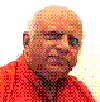My interest in writing this article came about after I heard an interview on BBC Hard Talk, when a young Egyptian woman, Mrs. Gameela Ismail, narrated her husband, Ayman Nour's ordeal at the hands of the Egyptian Authorities. My study takes me back 2000 years as it is not possible to understand the present, until I know how the modern situation came about
Summary
Ancient Egypt
Alexander the Great
Roman and Byzantine Rule (30BC-AD638)
Arab Islamic Epoch
The Fatimid Period (969-1171)
Ayyubid Dynasty (1171-1250) .
Ottoman Rule (1517-1798)
European conquest (1798-1802)
Mohammad Ali Pasha, 1805 to 1849
British Occupation (1882-1952)
Who set the boundaries of the Egyptian Republic?
End of British Protectorate
Modern Period
Conclusion
Political Change
Ancient Egypt
Egypt is and ancient civilization. Under the Pharaohs the kingdoms of Upper and Lower Egypt were united and came to be known as the Ancient Empire (3200-2270 BC). Ramses II is known for his buildings, temples and other monuments throughout Egypt.
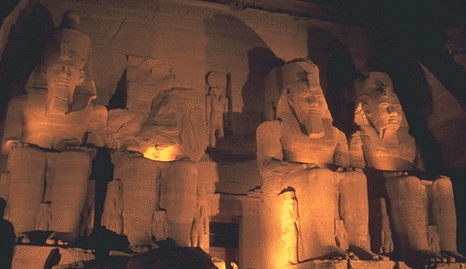
Abu Simbul Tomb
Alexander the Great
Alexander, from the region of Macedonia in erstwhile Yugoslavia, arrived in 332 BC. and founded Alexandria in 331 BC Alexandria became a major center for trading. for different communities of the region, making an important contribution to civilization. The successors of Alexander ruled Egypt until 30 BC and were succeeded by the Romans who remained in power until 642 AD Thus right at the dawn of the Christian era, Egypt came in contact with the white race of Europe.
Roman and Byzantine Rule (30BC-AD638)
Julius Caesar and Marcus Antonius his General had contacts with the Queen of Egypt. Octavius Caesar became the first Roman ruler of Egypt, who synthesized many Egyptian beliefs with their building of temples
Hellenism or the Greek culture remained a dominant force and Alexandria continued to be a center of Greek learning and trade. The Christian Era began in Egypt with the spectacular biblical Flight of the Holy Family from Palestine. To this day the stages of the journey of Mary, Joseph and their infant Jesus are marked by shrines and churches. According to Coptic tradition, it was not until the arrival of Saint Mark that Christianity was established in Egypt during the reign of Nero. Saint Mark began preaching the gospel in about AD40 and established the Patriarchate of Alexandria in AD61.
The Egyptian Coptic Church expanded over three centuries in spite of Roman persecution of Christian converts throughout the Empire.
Christianity was legalized and adopted as the official religion of the Roman Empire by the Emperor Constantine. It was in Alexandria where the great Catechetical School, which produced the early fathers of the Church. The eastern empire based in Constantinople became known as the Byzantine Empire.
The Western Roman Empire remained centered in Rome.
The fifth century monasticism emerged and the Coptic monasteries of Saint Catherine, Saint Paul and Saint Anthony were established. Arabs arrived. In 642 AD, and Egypt witnessed the beginning of its Arab and Islamic epoch.
Arab Islamic Epoch (640-969)
Arab Conquests
In this phase Arab blood was infused in the Egyptian population. Thus far, the genetic pool consisted of the Pharaonic race, the Nubians, the Greeks and the Romans.
The Prophet Mohammed's close companions decided to take his teaching to the world around them. They arrived in Egypt in 636 AD. The Muslim armies vanquished the Byzantines They took the Byzantine imperial capital of Alexandria. in 642 AD
The first rulers of Islam were the Umayyads who ruled Egypt from Damascus until the Abbasids (Caliphs of Baghdad) took control.
Egypt was invaded by Shi'aa Fatimid armies from Tunisia in 969 AD
The Fatimid Period (969-1171)
Sunni and Shi'aa schism
The Fatimid Dynasty traced their lineage from the Prophet's daughter Fatima Zahra and her husband Ali Ibn Abu Talib. They embraced Shi'aa doctrines which rejected the legitimacy of the first three Caliphs of Islam, Abu Bakr, Omar and Othman, who they claimed to be usurpers of Ali's right to succeed the Prophet in leading Islam as the first attempt to go to the roots of Islam. At first the Shi'aa, or "partisans" of Ali, were loyal members of the Muslim umma who simply disagreed with the political decision to bypass Ali. However, Umayyad machinations which lead to the assassination and martyrdom of Ali and his sons Hasan and Hussein, hardened Shi'aa attitudes and led to a religious schism with metaphysical overtones which has persisted to this day.
The Fatimids established their imperial capital within the walls of a newly built imperial city called Al Qahira, (Cairo) Within the walls of the city were lavish palaces like the Azhar Mosque and its University, which is now the world's oldest existing learning institution.
Egypt flourished under the Fatimids Khalif Al-Hakim supported the Byzantines against Roman Christians and the destruction of the Holy Sepulcher in Jerusalem was ostensibly the reason for the First Crusade.
Fatimid rule continued over Egypt for another 150 years and the country continued to prosper. However their empire gradually declined due to external pressure from the Seljuk Sultans who captured Syria from the Fatimids, and the Christian crusading armies which conquered Fatimid Palestine and the Lebanon. Fatimids collaborated with the Franks, an act which outraged the Seljuk Sultan Nuraddin of Turkey, who sent an expedition to overthrow the Fatimids.
The Sultan deputized his general Shirkoh to repel the Fatimid and Frank armies. His nephew Salah al-Din Al-Ayyubi to capture Alexandria, thus opening the way for the Ayyubid Dynasty.
Ayyubid Dynasty (1171-1250) .
Salah al-Din Al-Ayyubi (Saladin) assumed control of Egypt upon the death of the last Fatimid Khalif in 1171. When the Crusaders attacked Egypt, burning part of Cairo, (Note how these unwise political decisions of the White Christians sow the seeds of hatred which they are reaping after so many centuries !)
Salah al-Din spent eight years of his 24-year reign in Cairo, during which time he established the Seljuk Institution of the madrassa, (misunderstood by the West) , built hospitals and other infrastructure. Salah al-Din also introduced Mamlukes (an Arabic word meaning "owned"), Turkish slaves from the Black Sea region who had been raised as mercenary soldiers. Under Salah al-Din and his successors the Mamlukes were given a measure of freedom to own land and raise families and some rose to positions of power and influence.
Upon the death of Salah al-Din in 1193, he was succeeded by his brother, al-Adil, following a protracted succession dispute. Al-Adil died in Syria, upon hearing the news of the crusaders' seizure of the chain bridge at Damietta in 1218. He was succeeded by his son and Salah al-Din's nephew, al-Kamil, who drove back the Fifth Crusade. His successor, Sultan Ayyub, increased the size of his Mamluke army and married a slave girl called Shagarat Ad-Durr (Tree of Pearls).
When Ayyub died, his wife became the first woman to rule Egypt since Cleopatra. She was the last ruler of the Ayyubids. Injunctions against women rulers placed Shagarat Ad-Durr in an untenable position and the Abbasids forced her to take a husband. When her new husband, Aybak, planned to take a second wife, Shagarat Ad-Durr had him murdered. She was assassinated shortly after this and the Mamluke military commander Baybars assumed control, ushering in the Mamluke period.
The Mamluke Period (1250-1517)
Baybars, one of the great Ayyubid commanders, seized power in the aftermath of Shajarat Ad-Durr's murder but his heirs were murdered by Qalawun, another Mamluke who established the Bahri Mamluke dynasty, named after the Mamluke garrison along the Nile River (Bahr Al-Nil).
How Wars undermine the countries
Advantage of Diplomatic solutions
Heavy taxation was levied to pay for these campaigns, debilitating the economy of Egypt. Conditions were exacerbated by a plague that swept through the country during the reign of Barquq's son Farag. It was not until the reign of Sultan Barsbey that Egypt regain its power. Barsbey recognized the rising power and potential threat of the Ottoman Turks and established good relations with them. He also extended Mamluki trade. Nevertheless, the Mamluke economy remained unstable for nearly a century until the reign of Sultan Qait Bey, another great Mamluki builder, who constructed mosques, madrassas and other buildings throughout the empire.
Ottoman Rule (1517-1798)
Although the Ottoman Turks were brilliant military strategists and developed a rich Islamic civilization, they were poor colonial administrators. They ruled Egypt from Istanbul (Constantinople) through Pashawat (plural of Pasha) who were trained in Istanbul. Their direct involvement in government rarely extended to more than enforcing tax collection. Otherwise the Ottomans exercised minimal control over their new province and relied on the Mamluke army whose ranks continued to expand with mercenary slaves brought in from the Caucasus.
This lack of concern manifested in neglect and deterioration which opened the way for the French invasion of Egypt in 1798.
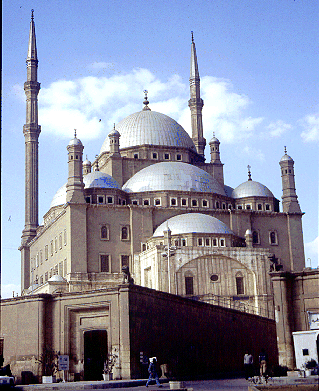
Mohammad Ali Mosque
European conquest (1798-1802)
Napoleon Bonaparte arrived in Egypt on July 2nd 1798, and this initiated a new phase in Egypt's history.The armies of Napoleon defeated the Mamlukes at Imbaba and occupied Cairo. Napoleon's aimy was to block British trade routes to India and to establish a Francophonic society in Egypt. He imposed a French administrative system and implemented public works projects to clean up and renovate the long-neglected country, clearing blocked canals, cleaning the streets and building bridges.
Within a month of entering Egypt the British, under Admiral Nelson, attacked and destroyed the French fleet moored at Abu Qir Bay in Alexandria and the Ottoman sultan threatened war against the French.
Napoleon returned to France, leaving his armies behind. General Menou, who claimed to have converted to Islam and declared Egypt a French protectorate.
Although it could be said that the Ottoman Empire was by this time already a spent force, the humiliation of Napoleon's entry into Egypt was a devastating blow to pan-Islamic pride. It has been said that contemporary Muslim fundamentalism traces its psychological origins to this initial shattering defeat.
Mohammad Ali Pasha, 1805 to 1849
After the departure of the French expedition, Mohammad Ali, an Albanian lieutenant in the Ottoman army, rose to power with the support of the Egyptian people. His rule extending from 1805 to 1849 was an eventful period in Egypt's modern history.
Although Mohammed Ali Pasha was nominally a representative of the Ottoman Sultan he was for all intents and purposes an absolute ruler. He was dedicated to the modern development of Egypt, building factories, railways and canals, bringing in European architects and technicians to create a modern state. Mohammed Ali was also an ambitious expansionist whose armies extended his power over Syria, Sudan, Greece and the Arabian Peninsula until by 1839 he controlled a large portion of the Ottoman Empire. He is regarded as the father of modern Egypt who set the country on the march towards modernization.
Mohammed Ali died in 1848 leaving his grandson Abbas to succeed him.
Said Pasha, the son and successor of Abbas who succeeded Mohammed Ali Pasha, reversed his father's policies and actively set about developing the country's infrastructure and initiated the building of the Suez Canal. which was completed in 1869 by his successor the Khedive Ismail.
In 1863, Khedive Ismail, a member of Mohammad Ali's dynasty, rose to power. It was during his reign, in 1869, that the Suez Canal was inaugurated. Under his rule, industrial and civil infrastructure was further developed. More factories were built. A telegraph and postal system was established. Canals and bridges were constructed and the cotton industry which had been introduced during the reign of Mohammed Ali, began to flourish as a result of the American Civil war which prevented southern cotton production for the duration of the war.
However, all this expansion had a price. Ismail's modernization put Egypt heavily into debt and the end of the Civil War and resumption of American cotton production caused a major recession in Egypt's cotton industry. As a result of this economic crisis, Khedive Ismail was forced to abdicate in 1879 and the British began to assume greater control over the country
British Occupation (1882-1952)
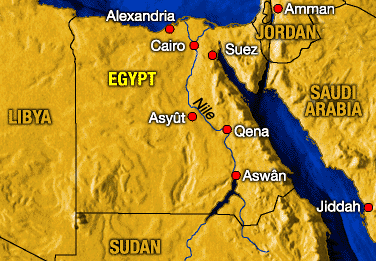
Map of Egypt
Towards the end of the 19th Century, and exactly on August 12th 1882, British troops landed at Alexandria marking the beginning of British occupation which lasted for 74 years. The sepoys of the British Empire in India had revolted in 1857. This had brought this colony under the crown, and was ruled by Vice Roys, who also cast their shadow over Egypt and other mandated territories.
Ismail's son Tewfiq Pasha reformed the Egyptian economy and was 'persuaded' by the Occupiers, to relinquish financial control to the British who began to run the government of the country.
Egyptian nationalists, horrified at Tewfiq's submission to the British, forced him to appoint their leader Ahmed Orabi as Minister of War, but the European reaction was swift and violent.
British retaliation
Alexandria was shelled and Ismailiyya occupied. Orabi's army was defeated at Tel El Kabir and the British reinstalled Tewfiq as a puppet. Orabi was driven into exile and Mustafa Kamel became the leader of the nationalist movement.
British influence over Egypt continued to increase. The country became an economic colony, totally dependent upon the import of British manufactured goods and the export of its raw cotton. The mandate of the League of Nations after outbreak of the World War I brought Egypt formally into the British Empire as a Protectorate when the Ottoman Sultan declared his support for the Germans against the allies.
Sa'ad Zaghloul was the leader of the nationalist movement during and after the first war and in 1918 he formally presented the British High Commissioner with a demand for complete autonomy which was rejected out of hand. Zaghloul's eventual arrest and deportation to Malta resulted in widespread anti-British riots, forcing the British to back down.
At this very time, there was a movement in India towards full independence, under Congress
The beginning of the 20th century witnessed the awakening of the national conscience aiming at ending the British occupation. Mustafa Kamel, Sa'ad Zaghloul, Mustafa El Nahas and many others were prominent figures who strove to achieve two national objectives; independence and constitutional reform.
On the 28th of February 1922, Britain unilaterally declared the termination of the British Protectorate and declared Egypt an independent state. In 1923, the first Constitution was promulgated and Sa'ad Zaghloul formed the first representative government of Egypt. It was around this time they also carved the territories of the Ottoman Empire in Iraq, Jordan and the Arabian Peninsula. This intrigue was set in motion by the Vice Roy of India. At the conclusion of the first World War which forced the Kaiser of Germany to abdicate (as Germans suspected, their German Jewish bankers had shifted the loyalty after the Balfour Declaration to the British Crown, and a consequence of this was mass immigration of Jews into Palestine.) Oil reserves were discovered and the carving was so arranged that the foreign power could still dictate its terms even after nominal granting of independence. This has to be kept at the back of the mind when you watch the machinations now in the year 2006 !.
After the 1948 Palestine War, political, economic and social frustration intensified in Egypt. This led to the formation of the Free Officers Movement, which was created by a group of young officers who felt that they had been betrayed by their own government.
Who set the boundaries of the Egyptian Republic?
Following the end of the Egypto–Turkish War and the Treaty of London in 1841, the Ottoman Empire issued a decree, on the appointment of Mohammed Ali Pasha as Governor of the subject state of Egypt. A map accompanying the decree indicated the western boundary of Egypt with Tripoli, a Turkish vilayet between 1835 and 1912, as extending southeastward in an irregular line from Khalij al Kana'is on the Mediterranean to a point immediately east of the 29th meridian and slightly north of the latitude of Aswan. More
End of British Protectorate
In 1922 the British ended the protectorate and recognized Egypt's independence, while maintaining control over the essential government institutions and the Suez Canal.
Fouad was proclaimed King of Egypt in March of the same year. The years that followed were characterized by a triangular power struggle between the British, the King and the nationalist Wafd party which had the support of the population.
Farouk, the son of King Fouad, ascended the Egyptian throne in 1935. In the beginning, the reign of King Farouk was greeted with enthusiasm by both the Wafd party and by the rapidly growing Muslim Brotherhood. Farouk was, amazingly, the first Egyptian ruler of the descendants of Mohammed Ali Pasha to speak fluent Arabic.
Turkish had been the court language of all his predecessors. Moreover, Farouk seemed to have nationalist sympathies. The young ruler was, unfortunately, too weak to defy the British. Within a year he had signed the Anglo-Egyptian Treaty which gave British forces the right to remain in the Suez Canal Zone while ostensibly ending the British occupation of Egypt.
With the outbreak of World War II, the Wafd Party threw its support behind the allies on the understanding that Egypt would gain full independence once the war was over. But hatred towards the British rule was so intense by this time that clandestine support for the Germans existed in nationalist factions like the Muslim Brotherhood.
Egypt became a major strategic asset and base of operations during World War II. Cairo and Alexandria were filled with soldiers, spies, political exiles and government leaders. The decisive battle in the North African campaign was the Battle of El-Alamain in the desert outside Alexandria. General Montgomery's Eighth Army drove back Rommel's Afrika Korps and the allies swept across North Africa to victory.
With the allied victory and the end of the war, the Wafd party called for the immediate evacuation of British troops from Egypt. The British were slow to respond and Egyptian resentment exploded in anti-British riots and strikes instigated by the highly organized Muslim Brotherhood under the leadership of Hassan Al-Banna which had grown in power and influence during the war years. It had always been the Muslim Brotherhood position that the war between the allies and the axis had nothing to do with Egypt or Muslims. The leadership of the Muslim Brotherhood refrained from open opposition to Egyptian support for the allies during the war years but lashed out at the British presence after the war. Under joint pressure from the Brotherhood and the Wafd, British troops were evacuated from Alexandria and the Canal Zone in 1947.
One can see a parallel in what is happening in Iraq in 2006, and the likely outcome, and consequence to those who decided to initiate the intervention
The following year the Arab world suffered a shattering blow when a joint Arab invasion of the newly declared State of Israel was ignominiously defeated by the smaller Israeli army. Ashamed and appalled by the decadence and gross incompetence of their leaders, a group of idealistic young Egyptian officers were to emerge as leaders of a revolution which would alter the course of modern Arab history.
When parliamentary elections were held in 1952 the Wafd Party won the majority of seats and Nahas Pasha as prime minister repealed the 1936 treaty which gave Britain the right to control the Suez Canal. King Farouk dismissed the Prime Minister, igniting anti-British riots which were put down by the army. This event compelled a secret group of army officers, which became known as the Free Officers, to stage a coup d'etat and seize control of the government.
King Farouk was forced to abdicate and General Naguib -- as the most senior officer, the nominal leader of the group -- became prime minister and commander of the armed forces. In reality a nine-man Revolutionary Command Council (RCC) led by Colonel Gamal Abd Al-Nasser ruled Egypt and ruled decisively.
The monarchy was abolished, all political parties (including the Wafd Party) were banned and the Constitution was nullified.
This is what happens to regimes which are imposed on occupied territories by the victorious powers, which eventually get turned on their heeds, by local demands.
In 1953 the Egyptian Arab Republic was declared. The rule of the Revolutionary Command Council seemed benign and heroic at the beginning; their coup had been bloodless and their reforms popular. But the RCC became increasingly radical and when the older Naguib tried to exert some control over the younger officers, he was placed under house arrest and removed from power in 1954.
Abd Al-Nasser became acting head of state and in 1956 officially assumed presidency of the republic
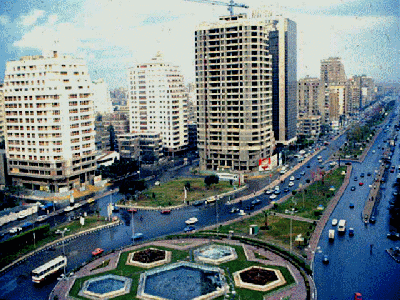
Modern Cairo
Modern Period
On the 23rd of July 1952, the Free Officer Movement led by Gamal Abd El-Nasser seized power in a bloodless revolution which allowed King Farouk to leave the country with a full royal salute. On the 18th of June 1953, the monarchy ended and Egypt was declared a Republic and Mohamad Naguib was named as the first President. In 1954 Nasser, who was the co-founder of the Non-Aligned Movement with Jawaharlal Nehru, assumed control as the second president. During Nasser's presidency, extensive agricultural and industrial development projects were carried out. Progressive economic and social reforms were implemented for the benefit of the majority of the Egyptian people.
Gamal Abd-Al Nasser
Gamal Abd-Al Nasser was a charismatic and brilliant political leader who achieved unprecedented popularity both in Egypt and throughout the Arab world. He was admired for his rousing support of Arab Nationalism; his domestic social programmes (which, for the first time in Egypt's history, sought to better the lot of the peasant majority); his dramatic nationalization of the Suez Canal; and also because of Egypt's heroic stand against the British invasion.
However Nasser's vehement opposition to Israel and his outspoken criticism of the West lost him US and European support for the building of the Aswan High Dam, forcing the Egyptian president to turn to the Soviets for aid. The need for capital to build the High Dam is cited as one of the reasons for nationalizing the Suez Canal. Whatever Nasser's initial intentions, the Suez Crisis propelled him to the forefront of the Arab Nationalist movement. Pan Arab unity became the overriding theme of the Arab world from the late 1950s up to 1967 and Nasser became its chief advocate and spokesman. The most dramatic display of Pan-Arabism took place in 1958 when Egypt united with Syria to form a single country, the United Arab Republic. But Nasser, for all his oratory, was essentially an Egyptian nationalist. The practical interests of the two countries never meshed and the union came to nothing.
But Nasser's revolutionary pan-Arabism was not all talk. Egypt entered the Yemeni civil war against the monarchy on the side of leftist guerrillas, further alienating the west and Saudi Arabia. At the same time he strengthened Egypt's ties to the Soviet Union, relying on the communist bloc for technical and military assistance to build an army to fight the US-supported Israeli army. Nasser also supported the formation of the Palestine Liberation Organization, further alienating him from the West. Nasser's relations with the West were complex. He knew that he could never develop Egypt without large infusions of foreign aid and he knew that the West was the most reliable source of this aid. Yet he came to discover that the more anti-Western his stance appeared to be, the more foreign aid he was offered by western countries to buy his moderation. When at one point in his regime he became more conciliatory to the west, his foreign aid dropped dramatically.
As a founding-leader of the Non-aligned movement Nasser could have it both ways. Along with India's Nehru and Indonesia's Sukarno, Gamal Abd-Al Nasser became a major international power-broker in the politics of the developing world. Nasser's pan-Arab politics of the period tend to overshadow the achievements of his regime.
Land reform was put into effect, breaking up the large feudal estates into smaller parcels of land and redistributing land to the fellaheen who for millennia had been an underclass of serfs. When the Aswan High Dam was completed, arable land in the Nile Valley increased by 15%. Nasser also built the country's industrial base, powered by electricity generated from the High Dam. Prior to the revolution, Egypt had been an elitist society with few, if any, state-sponsored benefits to the large majority of the population. The new government established extensive free educational programmes for both boys and girls and developed the country's medical infrastructure.
The country had to pay a heavy price for much of this development. Political repression and censorship increased. The educated classes and political elite who could have contributed to the building of the country were disenfranchised and persecuted. They were replaced by an under-educated socialist bureaucracy which provided Nasser with his power base, but which was grossly incompetent, setting the lowest possible standards for the administration of a great country.
Economic stagnation and industrial and agricultural inefficiency subverted real development. Rhetoric had replaced reality. The Six-Day War of June 1967 marked the end of Nasser's Pan-Arab dream. The Arab world's ignominious defeat by Israel ended in the Israeli occupation of Syria's Golan Heights, the Gaza Strip and the West Bank in Palestine and, most painfully for Egypt, the Sinai. However, the greatest symbolic humiliation for the Arabs was the fall of Jerusalem.
The bombastic rhetoric of Arab leaders now seemed like so much hot air. Hatred of Israel and its chief supporter, the United States, reached a pinnacle. The defeat of the Egyptian army and the loss of Sinai would have destroyed the political career of any Arab leader of lesser stature and indeed, Abd-Al Nasser offered to resign as president. Such was his extraordinary popularity that the Egyptian people staged massive spontaneous demonstrations in support of the president and he remained in power.
His death in 1970 of a heart attack sent shock waves throughout the Arab world. In a stunning display of emotion, millions of Egyptians followed his funeral procession through the streets of Cairo.
Nasser had discovered that if Arabs formed a united front, they could have countervailing influence on world politics. This was also realized by those vested interests, who would stand to lose. Using them as a counter force, distant powers, who in their own national interest would use these disgruntled forces to undermine this dream.
It thus goes to show, that this unity can not be achieved from above. It should rise from grass roots, and it will happen under two circumstances: the weakening and bankruptcy of the present powerful forces who aim to undermine their potential enemies, and awakening among the suppressed people, the realization of the power which is within one's reach.
Anwar El-Sadat (1970-1981)
With the death of President Nasser in September 1970, Anwar El-Sadat assumed office. On October 6th, 1973, the Egyptian army crossed the Suez Canal, stormed the Bar Lev line and recaptured parts of Sinai occupied by Israel in 1967. To overcome the state of belligerency, President Sadat announced his historic initiative to visit Israel in pursuit of lasting peace, which he did in November 1977. Finally, the Egyptian-Israeli Peace Treaty was signed in March 1979. The Sadat period witnessed changes in the political, social and economic domains, and at the same time, the private sector was given a greater share in the country's economy through the implementation of the "Open Door Policy".
Sadat had been one of the original "Free Officers Group" and served as Nasser's vice-president and chosen successor, but he had never been taken seriously until he assumed control of the government. Sadat began to systematically reverse the failed socialist policies of his predecessor, ultimately expelling the Soviets and reforming the economy.
But it was Sadat's surprise attack against Israeli forces in the Sinai on the Jewish holiday of Yom Kippur during the Muslim holy month of Ramadan on October 6, 1973 which gave Sadat the credibility which earned the respect of his countrymen. The "October War" shattered the image of Israeli invincibility which had persisted since the Six-Day War and gave the Arab world a tremendous psychological boost. Although the war turned against the Arabs and ended in a stalemate, Sadat emerged as a hero. Sadat then set about liberalizing the Egyptian system. Political prisoners were granted amnesty, censorship of the press was lifted and political parties were allowed.
Sadat also made a show of reversing the harsh secularism which was beginning to alienate the still traditionally religious middle classes by strongly identifying himself as a devout Muslim. At the same time, he instituted the Infitah, or "Open Door" policy, encouraging foreign investment and the development of the private sector. Gulf Arab investments began to flow into the country and international investment and foreign aid increased. Still, the specter of another debilitating war with Israel loomed. After years of socialist privation and militarism the Egyptian people had had enough.
Although there were still echoes of pan-Arabism, the booming oil-producing Gulf economies had undergone a shift in attitude. At the same time, Egypt was facing pressure from the International Monetary Fund to remove the food subsidies, which were sapping the country's financial reserves. Sadat knew that this would undermine his political power so, instead of graduating the removal of subsidies, he did it in a single day at the beginning of 1977, causing prices to double suddenly and igniting what have been called the food riots. It was a brilliant ploy that caused the IMF to back down and reschedule Egypt's loans and the US to increase its foreign aid to the country.
Food subsidies were immediately reinstated. Sadat made his most dramatic and controversial political move later the same year. On November 19, 1977 Sadat suddenly traveled to Jerusalem with overtures of peace to Israel. On a global level the move was brilliant, catapulting Sadat to the front ranks of international diplomacy. He became the darling of the west and gave the Arab world a new image of moderation.
On a domestic and regional level, Sadat's peace initiative was to outrage the Arab world and alienate the president from many of his people. Never as charismatic as his predecessor, Sadat was perceived as a traitor, toeing western interests.
Egypt was the first Arab state to recognize Israel's right to exist and the subsequent Camp David agreements, which won Sadat and Israeli Prime Minister Menachem Begin the Nobel Peace Prize, further isolated Egypt from the rest of the Arab world. The Arab League relocated from Cairo to Tunis and many Arab countries severed diplomatic and trade relations. Sadat's cultivation of the West, which was initially greeted with enthusiasm by most Egyptians, began to backfire after the peace initiative.
Economic liberalization, which brought wealth to the upper and middle classes, brought inflation to the country and increased the poverty of the lower classes. Sadat's support for Islam also began to backfire as groups like the Muslim Brotherhood gained wider support and became more vocal in their criticism of government economic policies and the Camp David agreements which were portrayed as a sell out to the Zionists.
Militant fundamentalist groups throughout the Arab world and in Egypt began to call for Sadat's overthrow or assassination. After relaxing government repression Sadat resorted to wide-scale arrests and the western media who had coddled him since Camp David, suddenly turned on the president.
In October 1981 Sadat was assassinated at a military parade. He had become so isolated from his people by this time that his death and funeral elicited little reaction from a people that had poured into the streets in grief when his predecessor Nasser had died.
One has to see parallels in contemporary politics - BJP came to power in India as as a fundamentalist Hindu party, but in power it could not be fundamentalist, and had to take pragmatic decisions. This is the need imposed by the practical difficulties of administering a large territory with divergent interests. In the same way, Islamic party which came to power in Turkey had to turn pragmatic, once in power. Hamas in Palestine too can not afford to be confrontationist while in power in spite of the fears expressed by US and Israel. Muslim Brotherhood if it comes to power in Egypt will also learn the same lesson. But to gain the attention of people who are not well read, with no access to information, can only be influenced by topics closely related to their 'umbilical' chords and beliefs !.
Unfortunately, this approach has to succeed by confrontationist political approach, which undermines the economic growth achieved by a country. The work has to be started all over again. This is surely beneficial to those who undermine these countries, which might turn out to be the future antagonists whom they will have to face. I hope that people take a broader look at themselves and their national interests.
The rule of Mubarak (1981-present)
In October 1981, Vice President Hosny Mubarak succeeded Sadat as President. Economic reforms undertaken under Mubarak succeeded in diverting finance towards productive investment in industry and agriculture. The main features of Egypt's national economic policy under President Mubarak are the efforts to broaden the economic base by promoting local, Arab and foreign investment. A process of successful privatization has started, the stock exchange has been revived, and reform programs with the IMF and the World Bank have been signed and implemented.
Hosni Mubarak became President on October 14 following the assassination of late Anwar As-Sadat in October 1981.There were some improvements in Egyptian foreign affairs during 1984; Egyptian diplomacy managed to overcome the antagonistic reactions to the Camp David agreements. Their new position on the Palestinian question was based on the argument that "any fair settlement of the Middle East question had to take into full account the rights of the Palestinian people" assuring that "Arab solidarity was the only way to recover the usurped rights".
From early 1985 the economic situation became more difficult as revenues from oil, emigrants’ repatriated pay, canal fees and tourism, considerably declined. Islamic Fundamentalism was very powerful in opposition and became increasingly so as the Government’s popularity plummeted.
Between 1980 and 1986 there was a significant increase in the role of foreign capital in the Egyptian national economy and US aid continued to be a very important source of income. The Egyptian foreign debt increased from $2.4 billion in 1970 to $35 billion in 1986.
Representing contact between the Arab countries and the United States, Mubarak proposed, in the UN General Assembly in September 1989, arranging an Israeli-Palestinian dialogue, with no prior conditions. In October of the same year, relations with Libya were renewed.
The Iraqi troops invaded Kuwait in August 1990; Egypt was among the first Arab countries to condemn the action and sent troops to the Gulf immediately. The US announced the cancellation of the Egyptian military debt (approximately $7 billion) upon launching the land offensive to liberate Kuwait in January 1991. The foreign debt reached a record $40 billion in 1990. Per capita income averaged some $600 per year, with over a third of the population living below the poverty line. In May 1991, the IMF approved a stand-by loan of $372 million to Egypt, conditional on an economic "structural adjustment plan".
Cairo committed itself to privatizing State-run companies, to eliminating controls on production and investment and to reducing the current fiscal deficit from 21 per cent to 6.5 per cent of the GNP. In order to achieve these goals the government decided to cut back subsidies on food and other staples and to reduce the program of aid for the needy. On May 15 1991, foreign minister and deputy minister Esmat Abdel Majeed was named the new secretary- general of the Arab League. The appointment of Abdul Majeed, who is now replaced by the former Prime Minster Amru Musa, signified Egypt’s recovery of its leadership role within the Arab world.
The escalation of violence from Islamic fundamentalist groups led the Government to enact an anti-terrorist law and extend the state of emergency, which had been in effect for the past ten years, for another three years. According to official statistics, this violence resulted in 175 deaths between February 1992 and August 1993. In May 1994, the President formed a committee to organize political talks between the Government and opposition with the exclusion of communists, the Muslim Brotherhood and groups representing the Coptic minority.
I would like to make an observation here that these anti terrorist actions were taken much before US realized the threat to its own security and went about fighting this threat with the notion of democratizing nations in these nations. Democracy had not prevented India from being a victim of terrorism, caused by grievances caused by decisions of political powers who handed over the reigns of power while departing from this country. The idea of divide and rule was a political tool in the arsenal of the colonial powers. Even after gaining independence these nations are not free from external political interference.
Internationally, Egypt recovered its main role in the Middle East peace talks and in the sphere of political exchanges between Arab countries. A meeting was held in Alexandria in December 1994 involving leaders from Egypt, Saudi Arabia and Syria. In February 1995, a summit joining leaders of Egypt, Jordan, Israel and Palestine was held in Cairo. In 1995, Mubarak was unable to find a solution to the confrontation with Islamic fundamentalists. In January, the Egyptian minister of interior, Hasan Al-Alfi attended a meeting of Arab countries’ interior ministers in an attempt to coordinate the fight against violence of the Islamic fundamentalist movements. In November 1995, the ruling National Democratic Party won the parliamentary elections with the participation of all the parties acknowledged by the Government. Elections, held amid a violent atmosphere, granted 416 of the 444 seats at stake to the ruling party, which provoked several accusations of fraud. In January 1996, Mubarak appointed Kamal al-Ganzouri as Prime Minister, replacing Atif Sidqi. Attacks by armed Islamic groups continued throughout 1996 and 1997, along with government repression of all such groups, including those opposed to the use of violence, like the Muslim Brotherhood.
Conclusion
Although modern day Egyptians are usually lumped together with "the Arabs" due to their language and Islamic traditions, this is not completely accurate. There is a truly Bedouin Arab grouping within Egypt, the majority still nomadic tribal peoples living in isolated oases and roaming through the country's vast desert regions. Many Bedouin Arabs are settled in the Sinai Peninsula and along the Red Sea coast, across from Arabia.
However, anthropologically, the majority of indigenous Egyptians trace their ancestry back to the Semitic tribe of Ham. Their physical appearance and cultural traditions are distinct from all other Middle Eastern peoples. The third main racial grouping in Egypt is comprised of the Nubian peoples who lived for thousands of years in their own land along the Nile, called Nuba, which overlapped from Upper Egypt into northern Sudan.
Most of Nuba was flooded in the time of Gamal Abdel Nasser with the construction of the Aswan high dam and the creation of the artificial Lake Nasser. The Nubians were resettled by the government but much of their ancient culture and stunning architectural tradition has been lost. For millennia wave upon wave of conquerors has passed through Egypt, leaving traces in their descendants. Romans, Greeks and, more recently the Turks, Circassians (Mamlukes) and even French and English have intermarried with the Egyptians, adding further to the cosmopolitan melting pot.
For half a century the rural population has shifted to the main urban centers in search of employment. Until today nearly half the population reside in overcrowded cities. To remedy this, the Egyptian government has inaugurated a series of incentives to try and lure many Egyptians away from Cairo and Alexandria. Part of this programme includes the construction of industrial cities located well outside the main centers and the programme seems to be meeting with a measure of success.
There are a number of other small distinct minorities including Berbers, most of whom live around Siwa oasis and the 7 million Copts who share the same racial background as their indigenous Muslim countrymen but who were among those who remained wedded to their ancient Christian beliefs and traditions.
Religion
Islam is constitutionally established as the official religion of Egypt and around 90% of the population are Sunni Muslim with a small minority of Shi'aa Muslims and other non-Sunni sects represented. Egypt is one of Islam's most influential intellectual centers. Al Azhar University, the oldest university in the world, graduates Islamic scholars from every Muslim country on earth. The Rector of Al Azhar occupies one of the most important hierarchical positions in the Muslim world and exercises great influence over religious issues of the day.
Coptic Christians form the country's largest and most significant religious minority with government estimates claiming only 3 million Copts while Coptic Church estimates place the number at around 7 million. This disparity indicates an underlying tension between the dominant Muslim community and the Coptic minority, which has begun to flare up periodically in acts of vandalism with the rise of Muslim fundamentalism. Another one million or so Roman Catholics, Greek and Armenian Orthodox Christians as well as Protestants are also among Egypt's citizens. These groups, which thrived during colonial times, are now dwindling as a result of emigration. There is also a tiny and very discreet Jewish community which has also been depleted by emigration.
Language
Arabic is the country's official language. The Egyptian dialect is distinct from all others and, because of the country's dominance of the media (television, cinema, radio and music), the most recognizable and universal. Arab popular singers from as far a field as Morocco and Syria, often emigrate to Egypt and sing in the Egyptian dialect instead of their own.
Political Change
There is a movement to liberalize the Government by allowing multi party elections. After years of sheltered political management, old guard is anxious not to repeat the past and be pawns in the international intrigues, which have plagued this country for centuries. However, better judgment may prevail, and better days may come to the Egyptians.
The National Democratic Party (NDP)

The National Democratic Party (NDP) was established in 1978 by
late president Anwar Al-Sadat who headed the party till 1981.
After Sadat's death, the party has been chaired by President Hosni Mubarak
Goals
The National Democratic Party is working to guarantee basic
freedoms of the Egyptian citizens and ensure social peace, the national unity,
social justice and supremacy of law.
The Party is working to win a majority in the legislative election to guarantee
the implementation of its platform and policies.
The Neo Wafd Party

The party & presidential
elections:
The party nominated its head, Dr. Noaman Gomaa, to run for Egypt's first
contested presidential elections and trailed third in the polls.
Goals:
The party presses for introducing political, economic and social reforms,
promoting democracy, ensuring the basic freedoms and human rights and
maintaining the national unity.
The party also calls for abolishing the emergency law, solving the unemployment
and housing problems, upgrading the health services and developing the education
system.
Ummah Party
Al-Ummah party was established on June 25, 1983.
The party is headed by Ahmed Al-Sabahi Khalil.
Goals
The party platform presses for promoting the so-called socialist
democracy and adopting the Islamic sharia as the main source of legislation.
The Party expresses full support to efforts to establish peace with Israel.
Muslim Brotherhood Movement
Goals
Al-Ikhwan believe that ruling a government should be the step which follows preparing (most of) the society for accepting the Islamic laws. Otherwise, ruling a totally corrupt society through a militant government-overthrow is a great risk [5].
Preparing the society is achieved thru plans for: spreading the Islamic culture, the possible media means, mosques, and da'wa work in public organizations such as syndicates, parliaments, student unions, ... [6].
Parallel to that, distinct muslims should be trained to administer political, economical, social, and student organizations efficiently (and Islamically), as another preparation step. Moreover, the Ikhwan don't demand the rule for themselves; they welcome any leader who wants to establish a TRUE Islamic government to have all the Ikhwanic support and help.
Al Ghad Party

Dr. Ayman Nour
Ayman Nour, was born in 1964 in Al-Mansoura. He founded and leads the new liberal and democratic party Al-Ghad (the Party of Tomorrow), which stands for democracy, human and political rights.
I recently heard Mrs. Gameela Ismail, his wife, giving her point of view on BBC Hard Talk programme. She with her husband Ayman Nour have spear headed a secular alternative but have been less successful, as the people who vote do so based on their emotional needs and scanty understanding of political realities. On 29 January, Ayman Nour, a member of Egypt's parliament and member of the opposition was stripped of parliamentary immunity on allegations he forged legal documents and affidavits to register his Al-Ghad (Tomorrow) party.
Political Parties who have grass root support succeed. Creating it , is the most difficult of ventures. People need to find tangible benefits, and ideology is last on their minds. People tend to believe that a bird in hand is better than two in a bush, so proving the usefulness of one's ideas should be spear headed with all earnestness.
In the history we read so far, this is not surprising
I wish all the best for my Egyptian friends.
Beginning about 1875 the sanjak of Benghazi or Barka was administered separately from the vilayet of Tripoli. British military forces occupied Egypt in 1882; and until 1914, although nominally a vassal of the Turkish Empire, the state was in effect a United Kingdom protectorate.
During the Italo–Turkish War of 1911–12, Italy occupied the Turkish administrative units of Tripoli and Benghazi; meanwhile, Egyptian forces held the coastal town of As Sallum. On October 18, 1912, by the Treaty of Auchy, Turkey recognized Italian sovereignty in the occupied units which Italy then administered as the colony of Libya until World War II.
The United Kingdom officially declared a protectorate over Egypt on December 18, 1914, which remained in effect until Egyptian independence was proclaimed on February 28, 1922. Prior to Italian participation in World War I on the side of the Allies, Italy made a so called secret treaty with the United Kingdom, France, and Russia. Article 13 of the treaty, dated April 26, 1915, promised Italy favorable treatment relative to the acquisition of territory in Africa should there be an Allied victory. In response to Article 13, the Milner–Scialoja agreement in 1919 between the United Kingdom and Italy placed the oasis of Al Jaghbub in Italian Libya.
However, Egypt did not agree to the oasis being made a part of Libya at this time. Following Egyptian independence, an Egypto–Italian accord was reached on December 6, 1925, delimiting the entire Egypt–Libya boundary. During this period the governorship of Egypt was made hereditary in Mohammed Ali's family under Turkish suzerainty.
Southward from the Mediterranean to the 22nd parallel or the tripoint with Sudan
The accord was not ratified by the Egyptian Government until July 7, 1932. In the meantime an agreement dated November 9, 1926, clarified the northern part of the boundary and a mixed commission submitted its report in April 1927. Relative to the accord of 1925, Egypt acquired a considerable amount of territory westward of the boundary shown on the map accompanying the decree of 1841.
Approximately 180 miles were gained along the coast, including Bir Ramla and the ports of Matruh and As Sallum, and in the interior the boundary was extended as much as 260 miles westward, to include Siwah and Wahat al Farafirah.
On December 15, 1937, a commission met and arranged to move some of the boundary pillars westward in order to improve inter-visibility and to delimit the boundary as a series of straight lines between beacons instead of the previous line which followed the tracks between the beacons. Nine extra beacons were erected at this time bringing the total to 187.
Recording the final satisfactory completion of a chain of permanent beacons, was drawn up on May 3, 1938. Following World War II, claims were made by the Egyptian Government to Libyan administered territory on a number of occasions. Egyptian claims were made in memoranda to the Council of Foreign Ministers and their deputies at the Paris Peace Conference, in a statement before the Political and Territorial Commission for Italy during the same conference, in notes to various governments, and in declarations at the Third and Fourth Sessions of the General Assembly of the United Nations.
Based on strategic and historical considerations, the claims have varied from time to time, but usually include Bardiyah on the As Sollum plateau and Al Jaghbub. An Egyptian proposal to make the 24th meridian the international boundary between the 30th and 22nd parallels would automatically place Al Jaghbub in the territory of the United Arab Republic.
Libya was administered by the United Kingdom and France from World War II until independence on December 24, 1951. Pursuant to decisions made by the United Nations in 1949 and 1950, Libya was the first independent state created by the world organization.
On February 22, 1958, Egypt and Syria formed the United Arab Republic. Syria withdrew from the union on September 28, 1961, but the Egypt region has retained the terminology of the United Arab Republic as the official name of the state.
The Sudan was proclaimed a condominium by an Anglo–Egyptian agreement dated January 19, 1899 under joint British and Egyptian administration. The agreement established the parallel of 22° N. as the political boundary between Egypt and the Sudan, although the western terminus of the boundary was not determined until 26 years later by the Egypto–Italian accord of 1925. On January 9, 1954, a Sudanese self-government parliament was inaugurated, and on January 1, 1956, the Sudan achieved independence. Following an UN resolution in 1949, the country attained independence, as the United Kingdom of Libya on 24 December 1951.
Arbitrary boundaries though they may appear to safeguard the foreign interests, this meddling has repercussions even today, giving rise to hatred, impotent anger, and sabotage. As history has shown, constant wars deplete and sap the economy and power of the conquerors, and the subjugated and vanquished people rise and take the revenge as a result. The form of this revenge may prove the conflict of civilizations as a realistic theory, with savage consequences for the citizens of these foreign nations who are lulled by their governments, under false sense of security..
| Next > |
|---|













